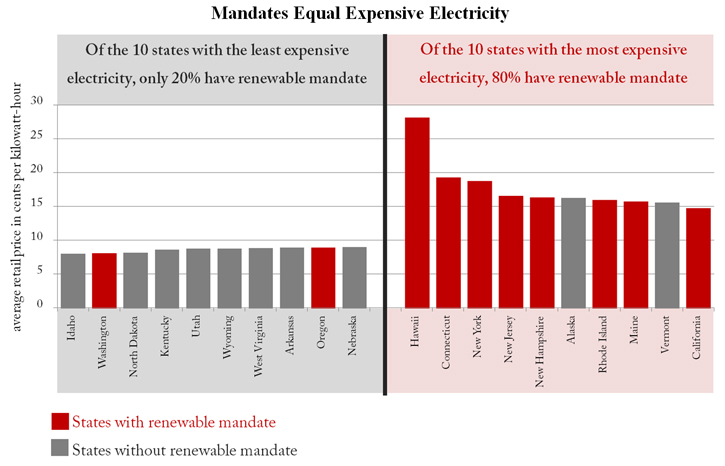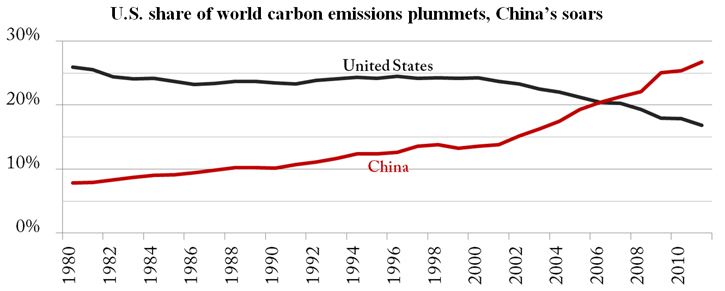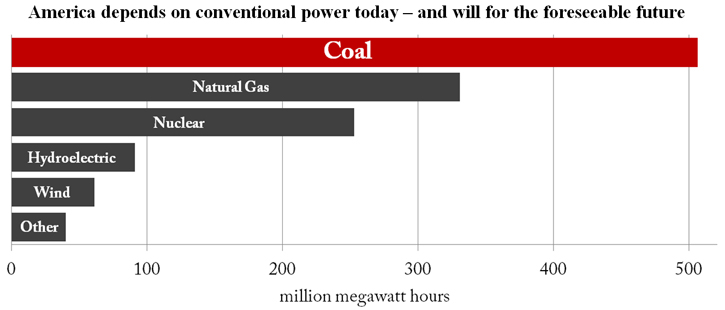Americans Can’t Afford Democrats’ National Energy Tax
President Obama began his rollout to “do more” to combat climate change last week -- not in America, but in a speech abroad at Berlin’s Brandenburg Gate. Today, in another speech at Georgetown University, he is expected to announce new executive actions to try to make his national energy tax a reality. Instead of approving the Keystone XL pipeline or other job-creating energy initiatives ready now in America, the President is pursuing anti-growth ideological policies embraced abroad. The President’s “national plan to reduce carbon pollution” won’t lower energy prices, generate jobs, or get our economy at home growing again.

“Unlike his other signature second-term initiatives … Obama can undertake all of these policies without congressional input,” according to an analysis in the Washington Post. “Though Congress could theoretically overturn an Environmental Protection Agency rule to regulate existing utilities under the Clean Air Act, Democrats have the votes they need in the Senate to block such an effort.”
The New York Times questioned the strategy: “Mr. Obama’s decision to use his executive authority to regulate utilities reflects a determination that he has no prospect of passing such sweeping policies through Congress. But while the Supreme Court validated the power of the executive to regulate carbon emissions without further legislation, the president’s move may draw lawsuits and other challenges from industry and Republicans citing the economic costs.”
Democrats should look to China to cut CO2 emissions
President Obama once characterized his election as “the moment when the rise of the oceans began to slow and our planet began to heal.” But by then, the U.S. share of global CO2 emissions already had been declining for nearly a decade -- from 25 percent in 2000 to 19 percent in 2008. These declines occurred without expensive, burdensome, and unworkable policies pushed by President Obama and Washington Democrats.

The declines, both the U.S. total and as a share of world emissions, have continued since 2008; but due to market forces, not government action. A primary reason has been increased electricity production from low-carbon natural gas, made possible by technological innovations in horizontal drilling and hydraulic fracturing that halved its price.
Meanwhile, CO2 emissions in China, India, and other developing countries are skyrocketing. China’s CO2 emissions exploded by 173 percent from 1998 to 2011 and are projected to continue growing. In comparison, U.S. emissions fell by two percent during the same period. India, with an annual growth rate as high as 7.5 percent, could surpass China’s emissions by 2020.
If growing global CO2 emissions are indeed a problem, the President and Washington Democrats should quarrel with China, India, and other developing nations, not American energy producers, consumers, and workers who are already doing their fair share.
Democrats’ national energy tax misses target, hits working Americans
During the past four years, the President, his energy and environment team, and congressional Democrats promoted spending, regulatory, and policy steps to reduce U.S. CO2 emissions in the name of tackling climate change. At every turn, they attempted to exploit federal power to shape the U.S. marketplace to give “green” energy an advantage over conventional fuels, while dismissing Republican proposals that would have advanced both.
Because of their failure to convince the American people to go along with these bad ideas in the past, Democrats have developed stealthier ways to target CO2 emissions, with unilateral executive actions. “But if Congress won’t act soon to protect future generations, I will,” President Obama defiantly proclaimed in his State of the Union Address in February. Now he is expected to do an end run around the will of the American people – and their elected representatives in Congress – with unilateral executive actions that impose more bad ideas that will raise energy prices and kill jobs:
War on Coal - IMPOSED
The Administration is waging a regulatory war on coal, setting standards so severe that up to 20 percent of existing coal-fired power plants will retire, and new ones will not be built. Industry will pay up to $130 billion to comply, and will pass those costs on to consumers. More than 250,000 jobs are at risk as coal-fired power plants go bankrupt and are retired, including four in Georgia and two in Texas this year. Electric reliability will decrease and electricity prices will increase. The President will announce a key weapon in his war on coal today: aggressive EPA regulation of CO2 from existing power plants.
Blocking Production of Fossil Fuels - IMPOSED
The Administration is restricting access to federal offshore and onshore oil and gas resources through moratoriums, permitoriums, and leasing plans, denying Americans billions in public revenue and thousands of jobs. It has brought coal, oil and gas production on federal lands to a nine-year low, and continues to block the Keystone XL pipeline, all in pursuit of its national energy tax. The President will announce expanded access to federal lands for renewable energy technologies that are incapable of providing Americans with affordable, reliable, abundant energy needed today. Democrats should join Republicans in demanding the President open federal lands to “all of the above” energy production -- oil, gas, coal, wind, solar, geothermal, hydropower -- instead of picking winners and losers.
Green Subsidies - IMPOSED
The Administration is dedicating scarce federal resources to promoting renewable and alternative energy technologies. In 2011, it provided renewable energy and energy efficiency companies with 78 percent of all federal energy tax incentives. In fiscal year 2010 alone, it launched nearly 700 initiatives at 23 federal agencies to promote renewable energy. All told, it will spend up to $150 billion on its green energy agenda between 2009 and 2014.
CAFE Standards - IMPOSED
The Obama Administration finalized new fuel economy standards that will add $3,000 to the price of a car, and reduce safety. The up-front cost of new emissions equipment will more than wipe out any fuel savings, even with gasoline selling at $6 per gallon.
Tier 3 Rule - PROPOSED
The Administration’s proposed “Tier 3” rule could increase the cost of manufacturing gasoline by nine cents per gallon while providing negligible environmental benefits. To comply with this rule, energy refiners could actually increase their CO2 emissions. But the rule still fits within the Administration’s climate change agenda because it would increase the price of a carbon–intensive fuel. Other Administration policies have ramped-up environmental compliance costs for refiners, leading to refinery closures, reduced gasoline manufacturing, and elevated prices at the pump. When the imminent closure of a refinery in Philadelphia threatened to send gasoline prices higher before last year’s election, the White House went to great lengths to persuade a private equity firm to orchestrate a buy-out, even agreeing to loosen certain environmental restrictions to make the refinery viable as a business proposition. This deal stands as a tacit admission by the President that overregulation can destroy businesses.
Climate Change Litmus Test in Environmental Reviews - PROPOSED
Democrats want the environmental review of proposed coal export facilities to address CO2 emissions not just from the export facilities themselves, but from the mining and rail transportation of the coal to the terminal, and the burning of the coal in foreign markets like China, Japan, and South Korea. Imposing such a climate change litmus test could stop coal exports, costing thousands of jobs, billions in capital investment, and millions in tax revenue each year. Last week, the Army Corps of Engineers agreed it would be inappropriate to expand the environmental review of a coal export facility to include CO2 emissions from coal burned overseas. This was positive news for coal producers, not to mention manufacturers of other American goods dependent on export markets.
Carbon Tax - PROPOSED
Washington Democrats are contemplating imposing a direct tax on CO2 emissions. This July, Senate Democrats plan to push a bill that initially imposes a $20 per ton carbon tax that increases by 5.6 percent each year until the twelfth year, at which time the EPA administrator would be empowered to recommend the tax rate for subsequent years. The Heritage Foundation reports this bill would increase gasoline and natural gas prices by up to 17 percent and coal prices by up to 307 percent; thwart domestic fossil energy production, the one bright spot in Obama’s struggling economy; and destroy up to 450,000 jobs by 2016. It would risk triggering a trade war, waste billions more in taxpayer funds, and provide practically none of the environmental benefits its sponsors promise. Perhaps most disturbingly, its “rebate” scheme would reduce a family of four’s taxes in eight traditionally Democrat states (including those of the bill sponsors) while increasing a family of four’s taxes in 42 states -- by more than $2,800 in Louisiana, West Virginia, Alaska, North Dakota, and Wyoming.
Raising Taxes on Fossil Fuel Producers - PROPOSED
Congressional Democrats are demanding higher taxes on oil and natural gas producers of roughly $40 billion, making their products more expensive and undercutting their ability to compete in the global marketplace. The Obama Administration supported this policy in its budget and is sponsoring a $1.5 million study to research the effects of the U.S. tax code’s most important provisions on CO2 emissions, rather than on job creation or economic growth.
Clean Energy Standard - PROPOSED
The Administration proposed a Clean Energy Standard requiring that 80 percent of electricity sales in 2035 come from qualifying “clean” energy sources. The mandate would raise average electricity generation costs by 29 percent in 2035 and household electricity bills by $211. It would also destroy about a million manufacturing jobs by 2025.
Low-Carbon Fuel Standard - PROPOSED
The purpose of a Low-Carbon Fuel Standard (LCFS) is to lower the “carbon intensity” of transportation fuels and reduce CO2 by requiring the replacement of conventional gasoline and diesel with “low carbon” fuels like ethanol. Democrats included an LCFS in the 2009 cap-and-tax legislation, but it was removed prior to the bill’s narrow passage in the House. The problem is, affordable and reliable lower carbon fuel options do not exist. A nationwide LCFS reducing the carbon intensity of transportation fuels by 10 percent over 10 years could increase gasoline and diesel prices by as much as 170 percent, decrease household annual purchasing power by as much as $2,400, and destroy up to 4.5 million jobs.

Source: EIA, U.S. Power Generation by Source (Jan – April 2013)
It is clear most Americans do not share an appetite for the Democrats’ energy-price-raising, job-killing, economy-contracting climate change policies. Every time Democrats try to force them through the legislative process, the American people, through their representatives in Congress, reject them:
Cap-and-Tax - REJECTED
In 2009, House Democrats rammed through, on a party line vote, legislation to cap and tax CO2 emissions. Democratic Senators Barbara Boxer and John Kerry introduced similar legislation later that year. Their bill would have increased a family of four’s energy costs by $1,000 per year, including raising the price of gasoline by an additional $1.20 or more, and destroying more than 2.5 million American jobs. Senate Republicans ultimately defeated the Democrats’ disastrous cap-and-tax policy from enactment into law -- a wise decision given the recent collapse of Europe’s carbon emissions trading scheme and California’s cap-and-tax grab for additional revenues to fund out-of-control spending by state Democrats.
Kyoto Protocol - REJECTED
This global agreement called for the U.S. to reduce its carbon emissions by seven percent. Developing countries like China, India, and Brazil signed the agreement, but were not obligated to reduce their CO2 emissions. In fact, 80 percent of the world was exempt from compliance. In 1998, the Clinton Administration signed the agreement, but Congress refused to ratify it. In 2001, President Bush’s administration walked away from the agreement altogether. U.S. ratification of the Kyoto Protocol would have increased gasoline prices by up to 53 percent and electricity prices by up to 86 percent, while decreasing U.S. GDP as much as eight percent.
Energy Tax - REJECTED
President Clinton proposed taxing energy use as the centerpiece of his first budget. It provoked a brutal public backlash. Good thing the American people were on their toes. Enactment of the “BTU tax” would have raised $50 billion (in today’s dollars) in federal revenue annually, added $800 in additional taxes per family, and cost 700,000 jobs over three years.
Spending billions more on climate policies won’t create jobs
The President promised at the beginning of his first term to create long-lasting green jobs and committed $90 billion in stimulus funds to make that happen. All he achieved was wasting billions of taxpayer dollars on companies that later went bankrupt. When the President’s green investment program created jobs, they were outrageously expensive, temporary, or overseas.
The most famous example is Solyndra, which ended up costing an average of $6 million for every job created, only to lay off 1,100 workers when it declared bankruptcy. Other failed and failing companies in the President’s green energy investment portfolio similarly cut jobs as their technologies were exposed as not yet commercially viable: Fisker Automotive (238 employees cut); Abound Solar (280); Evergreen Solar (800); Amonix (200); First Solar (2,100).
America needs energy security, economic growth, and environmental stewardship. We will get none of these if the national energy tax proposals pushed by the President and other Washington Democrats are enacted.
Next Article Previous Article
